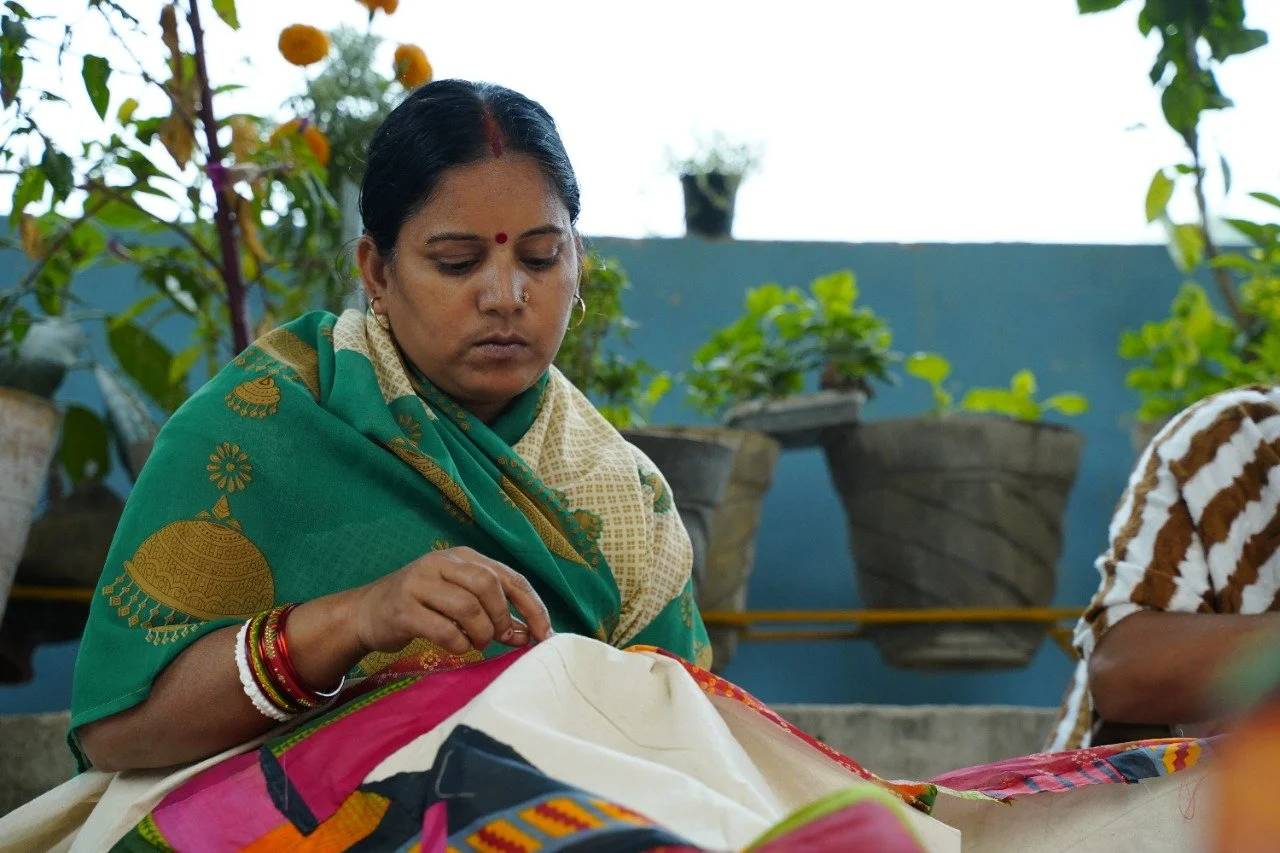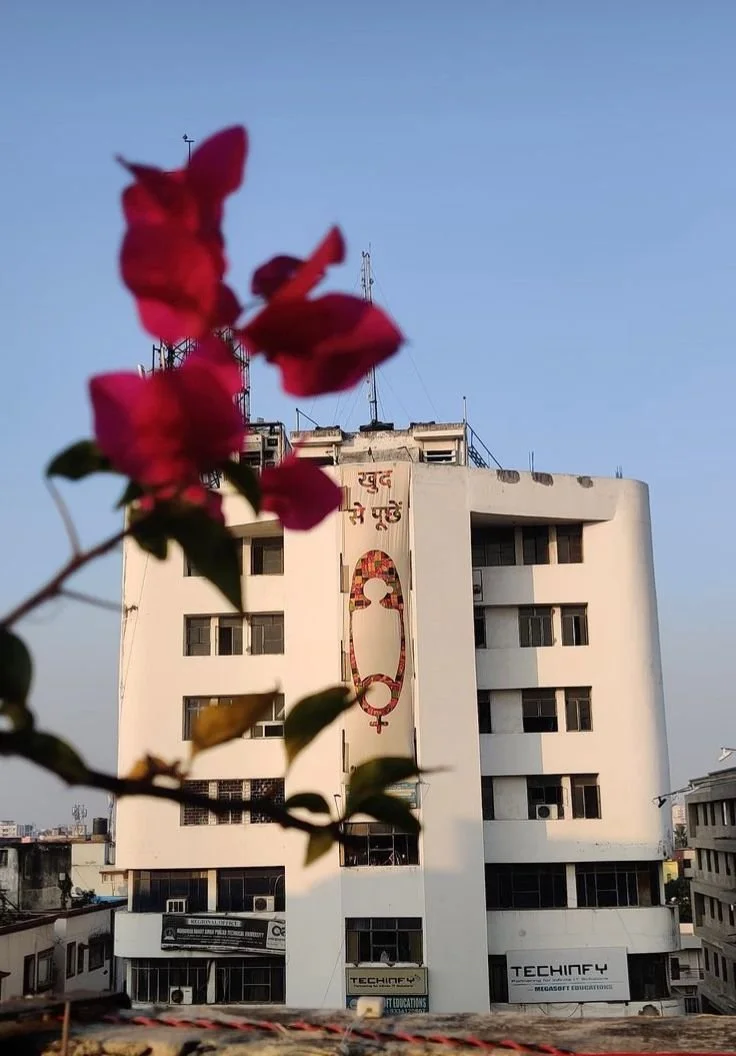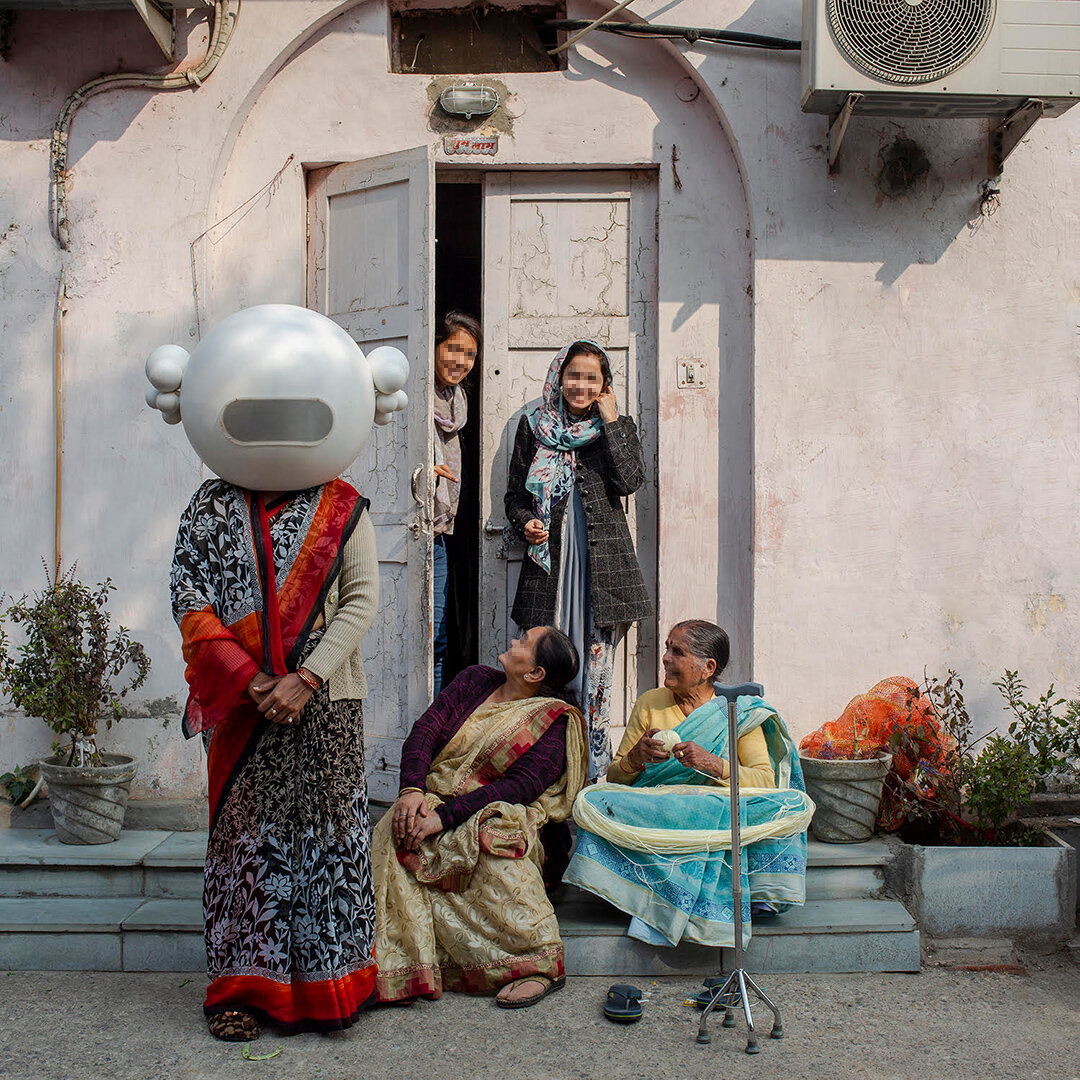The Women and the Safety Pin
The Khud Se Pooche installation in Patna
In Patna, Bihar, a community-led art installation Khud Se Pooche highlights the urgent need for women seeking access and dignity in healthcare.
Last month, pedestrians and commuters in Patna, Bihar would have paused to examine a huge, 40-ft art installation resembling the humble safety pin, draped over the Sumati Place building in the city’s Boring Road area. This work was a product of months-long collaboration of a women-led and women-centric movement Khud Se Pooche (‘Ask Yourself’) between the anonymous Delhi-based visual and performance artist Princess Pea, more than fifteen women partner-led Bihar organisations, and hundreds of women of Patna.
The installation amplified, to a large scale, the need to mainstream dignity, care, and a safe space for women in healthcare services. Woven in the appliqué technique, the installation featured the literal threads sewn together with the stories, ideas, and experiences of women relating to healthcare.
The impetus for Khud Se Pooche project and the underlying campaign arose from challenges regarding access to proper healthcare services for women in Patna. This is unfortunately a pan-Indian predicament, as women and girls across the country face gender bias while accessing healthcare services, are treated disrespectfully, and often encounter discriminations.
This lack of dignity to healthcare access became the crux around which Khud Se Pooche revolved. The project aimed to encourage the women of Patna to take a self-reflective journey to understand and articulate their interpretations of ‘care with dignity.’ What was crucial about this campaign was that it was a participatory one, motivating women to engage with other women and initiate a much needed conversation around healthcare, acknowledging both the lack of, and the need for dignity in healthcare.
Women’s stories, experiences, and their lived moments literally consist the warp and weft of the installation, which sought to build empathy and understand the gaps in healthcare from a gendered perspective. Princess Pea says, “The aim of this women-led initiative was an attempt to bring women closer.”
Patna-based organisations such as Sakhi, BihArt, Gaurav Gramin Mahila Vikas Manch, and Bihar Youth for Child Rights (BYCR) all helmed some of the project’s leadership role, inviting local women to apply to the programme, following which led to the creation of the installation through an in-depth engagement and participation model.
Also involved in the project was Princess Pea, a popular, anonymous artist masked under an oversized anime head. Princess Pea has been working with women’s issues for long in her art; for Khud Se Pooche, she led a special series of art-based workshops, orientations, and skilling sessions on storytelling and community organisation.
“Before I start any project which is a community-based one, the first thing that we must understand as artists is that there is no hierarchy in socially engaged practice. We are all co-participants,” Princess Pea said over an email interview, emphasising the entirely collaborative nature of the making of the installation. She also mentions how community projects such as these ones crucially command time. “You have to spend time developing relationships. It’d be a disservice to a community if you just come in and think you can grasp all the complexities of a place in a short time.” She adds that she hopes that her projects are site-specific or situational work, embedded in reality and not only in the idea of “artistic production”.
Women’s stories, experiences, and their lived moments literally consist the warp and weft of the installation, which sought to build empathy and understand the gaps in healthcare from a gendered perspective. Princess Pea says, “The aim of this women-led initiative was an attempt to bring women closer, make them see themselves differently but respect their beliefs, and install new ideas through each other’s life expectancies.” The thread of empathy and inclusivity continually ran through these workshops, where both Princess Pea and the women shared personal stories questioning the significance of care and dignity. “The symbol—a safety pin—was not just a drawing, but an emblem of their collection of voices to claim dignity and build knowledge about care and self-worth.”
Working with women ambassadors from Khud Se Pooche, Princess Pea engaged with a diverse group of women and used tools such as empathy maps, circle of life, interpretations of colors and objects, and storytelling. “In order to have heart-to-heart conversations with these women, the most important thing was to make them comfortable,” she says about her intent to make safe spaces which in turn sought to liberate the women’s inhibitions and encourage them to reveal their experiences. “Each woman who was a part of this workshop has a story within a story and each one is longing to be heard,” says Princess Pea.
“I have a lot of gratitude towards all the women ambassadors and partners who have supported us and enlightened us with so much knowledge and understanding,” says Samya Ghosh, the creative lead of Khud Se Pooche. “It is easy for people working on a project to get tunnel-visioned and use built-in biases and perspectives, but we tried our best to always keep the women at the centre of it.”
The insights from these sessions and the participation of women have formed the basis for the symbol of the campaign: the safety pin as a representation of a safe space. “It is a symbol of safety, a true companion which provides dignity, unity, and protection—and this installation uses it to articulate a single voice of women demanding dignified health care,” says Ghosh.
Image credit: Suryan Dang / The Pea Family Studio
The symbol was incorporated in a 40-ft x 9-ft textile-based appliqué artwork, Princess Pea working with 75 local artisans to bring the installation into existence. The choice of appliqué used to create this installation was apt, given both the nature of the craft, as well as the multiple conversations that have led to creating it. A community led initiative used to decorate large ceilings in Bihar, ‘khatwa’ or patchwork creates the narrative of their everyday life using fabrics from their homes onto a base of cotton, stitched together by women from across different cultural and socio-economic backgrounds. “The vocabulary used is indigenous to these women, the material used is from their personal belongings,” says Princess Pea, describing how the artistic and conceptual processes converged in the creation of the installation. “They are able to relate to the work and mobilise it in their own ways in everyday life.”
Sonam Kumar, a second-year college student who is also planning to pursue medical studies in the future, happened to get involved in the project by chance. “I participated in all interviews and tasks and really enjoyed it,” says Kumar, emphasising that what attracted her about this project was the opportunity to raise voice against the injustices that women are subjected to. “Many of us girls need this as we sometimes encounter very rude doctors who judge us badly. For example, why is it that they immediately assume that women are pregnant just because we have missed our periods?” Kumar feels that if women are already apprehensive about encountering judgment from and distrust the doctors, they are then in danger of not choosing to go to the doctor and letting the physical problem and suffering increase. “I have never stood to tolerate injustice and will never want to, whether as a patient or in future, when I myself will working in a hospital,” she says. The experience allowed her to locate a platform from which she could articulate these views as well as set a precedent for both younger and older women.
“In unity there is power,” says Kumar, and indeed, both the journeys leading to the installation and the work in itself conveys this sentiment.
So, when the passerbys would have seen this installation, they would have perhaps initially gazed at the vibrant patchwork, the symbol gradually coming into focus later on, wondering of the backstory behind its many components. Perhaps, a few then would have been impelled to learn more about the back stories surrounding the installation; specifically, the power of the collective narrative and art making which led to its creation. Whether be it a man or a woman asking the questions, an awareness of the issue at hand will hopefully become a much-needed catalyst for systemic change in the overhauling of women’s healthcare in India.
***
Priyanka Sacheti is a writer and poet based in Bangalore, India. She grew up in the Sultanate of Oman and has previously lived in United Kingdom and United States. She has been published in many publications, including Guardian, Literary Hub, Hyperallergic, and Scroll, with a special focus on art, gender, diaspora, and identity. Her literary work and art have appeared in various literary journals and anthologies. She's currently working on a poetry and short story collection. She can be found on Instagram: @anatlasofallthatisee and Twitter: @priyankasacheti.




